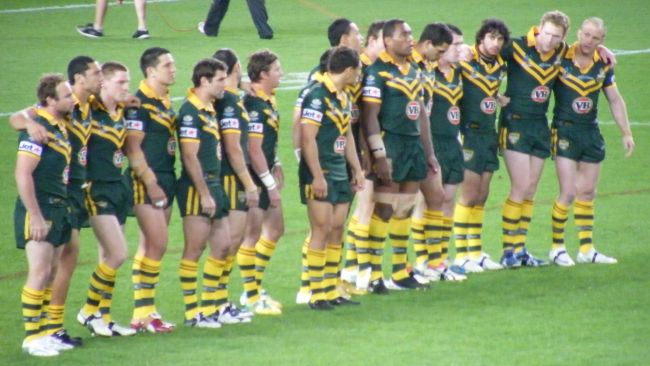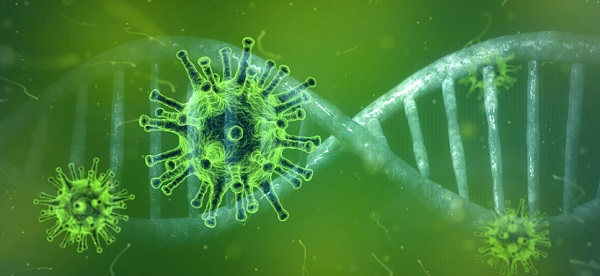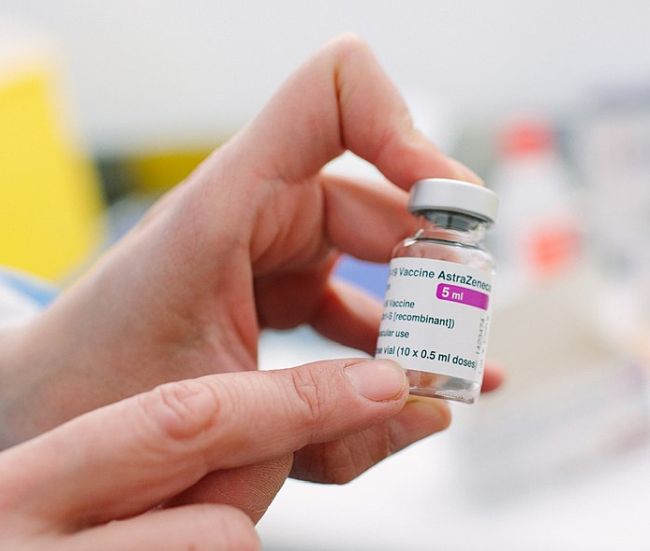Selected
- Details
- Written by Grant Broadcasters
- Category: Selected
- Hits: 148

Australia and New Zealand have withdrawn from the Rugby League World Cup due to be held at the end of the year in England, citing player welfare and safety concerns.
In a joint statement on Thursday afternoon, the Australian Rugby League Commission and NZRL urged the tournament to be postponed until 2022 to avoid the risk of a player catching COVID-19.
It comes just a week after tournament officials confirmed the event would go ahead with or without defending champions Australia.
© AAP 2021
Image Credit: paddynapper, CC BY-SA 2.0 <https://creativecommons.org/licenses/by-sa/2.0>, via Wikimedia Commons (image for illustration purposes only)
- Details
- Written by Grant Broadcasters
- Category: Selected
- Hits: 153

The Prime Minister is urging the Australian Technical Advisory Group on Immunisation to recommend the jab to people under 60.
Pfizer remains the preferred coronavirus vaccine for that age group.
ATAGI is advising the risks of extremely rare blood clots outweigh the benefits of AstraZeneca for under 60s.
But Mr Morrison believes coronavirus outbreaks across NSW, Victoria, and South Australia have changed the equation.
"When COVID cases are rising, that means people have a greater likelihood of catching COVID, particularly older people, then the balance of risk changes," he told 4BC radio on Thursday.
"I have just simply said 'the balance of risk is changing guys, so how is that impacting on your advice' and it's time to think about that."
Labor frontbencher Kristina Keneally said the prime minister was freelancing on AstraZeneca.
"He is seeking to shelve responsibility for his failures to have enough vaccine deals on to someone else," she told ABC radio.
"It is unfair pressure for him to be putting on ATAGI."
There were 124 new local cases of coronavirus recorded in NSW on Thursday, the highest since the outbreak began.
Health authorities are bracing for numbers to go even higher with at least 70 people in Thursday's numbers spending some time in the community while infectious.
NSW Premier Gladys Berejiklian said none of the state's 28 coronavirus patients in intensive care had received both doses of a vaccine.
"That is extremely encouraging. It means the vaccine is working in preventing serious illness," she told reporters in Sydney.
Just 14.5 percent of Australians aged over 16 have been fully vaccinated almost five months after the rollout began.
Australia has ample supplies of AstraZeneca, which is produced in Melbourne, but there is not yet enough Pfizer imports arriving to vaccinate people under 40.
Ms Berejiklian urged people under 40 keen to be vaccinated to talk with a doctor about receiving AstraZeneca, echoing the prime minister's comments.
Victoria also recorded its highest daily total of the current outbreak with 26 new local cases but only two were in the community while infectious.
Interstate travel is becoming increasingly difficult with states and territories isolating in a bid to stop the contagious Delta variant from spreading.
Queensland will shut its border to all of NSW from 1 am Friday, joining Victoria in putting statewide travel restrictions in place.
WA will close its border with South Australia where a cluster in Adelaide has grown to 14 cases.
© AAP 2021
Image: Pixabay
- Details
- Written by Grant Broadcasters
- Category: Selected
- Hits: 145

NSW's health minister is urging older Australians to get vaccinated, saying they are far more likely to die of COVID-19 if infected than from getting the AstraZeneca vaccine.
"I want to remind people that if you're over 60 and if you get COVID, you have a one-in-200 chance of dying," Brad Hazzard said on Wednesday.
"If you're over 50, you have a one-in-500 chance of dying if you got the COVID virus."
He says it's "far more effective" to avoid those risks by getting vaccinated, with NSW having a plentiful supply of AstraZeneca.
"If you have the vaccine, you have a one-in-two million chance of actually dying, so the odds are with you," Mr Hazzard said, referring to rare blood clots linked to the AstraZeneca vaccine.
"A bet on TAB and you'd be doing far better if you'd had the vaccine."
Mr Hazzard blamed the slow rollout on supply issues and said it was wrong to accept that the federal government had supplied additional AstraZeneca vaccines and they were in fact advance doses.
Premier Gladys Berejiklian said NSW was "up and running and ready to get jabs into arms" but needed more doses of the Pfizer vaccines in particular.
"We have around the capacity just NSW alone to do at least 3000 jabs a week, but we don't have that many Pfizer vaccines to meet that demand," she said.
"AstraZeneca is around. If you're over 60, get AstraZeneca."
In the 24 hours to 8pm on Tuesday, NSW recorded 110 new local infections and at least 60 of those people were circulating in the community for part or all of their infectious period.
© AAP 2021
Image Credit: Gencat, CC0, via Wikimedia Commons
- Details
- Written by Grant Broadcasters
- Category: Selected
- Hits: 148

Australians under 40 will not be eligible for Pfizer coronavirus jabs ahead of schedule despite increasing hospitalisations of younger people.
A teenager is included in NSW's 27 intensive care patients in NSW, with the majority under 60 and 24 unvaccinated.
Health Minister Greg Hunt pointed to Pfizer supplies as the main reason the vaccine rollout could not be immediately extended to under 40s.
"What we're doing at the moment is following the advice because there are a finite number of vaccines," he told reporters in Melbourne on Tuesday.
"At this point in time we're working through the 40 to 59 age group."
People under 40 are allowed to speak with a doctor about receiving AstraZeneca.
But Australia's expert immunisation panel ATAGI recommends Pfizer for that age group because of an extremely rare side effect.
Mr Hunt said ATAGI would provide advice on expanding the Pfizer rollout to other age groups but noted more vulnerable populations needed to be prioritised.
Just over one million people aged under 40 have so far received their first vaccine dose for a range of special reasons, official figures show.
One million doses of the vaccine landed earlier in the week with similar shipments expected over coming months.
September or October have been raised as potential markers for Pfizer to be extended to under-40s.
The Australian Medical Association's Andrew Miller warned the nation's previous good fortune with coronavirus ending because of new variants.
"Australia's learning now to dance with Delta," he told Sky News.
"We're seeing what it was that caused the fuss around the world and in India and other places where they were sadly overwhelmed."
Dr Miller said vaccines were achieving fabulous results in reducing hospitalisations but tempered expectations about opening up.
"This talk that we can maybe ease up on restrictions when we get to half the population vaccinated unfortunately that's a bit of a dangerous fantasy," he said.
The Perth-based anaesthetist wants Australia to urgently look at vaccinating children aged 12 and over.
He said Delta killed one in 1000 infected children and left six per cent with severe long-term symptoms.
"The fact that COVID can and does kill and disable young people is well known around the world," Dr Miller said.
"Even though it happens more rarely than in nursing homes, this is not a disease of the elderly."
Pfizer has applied for approval to lower the age limit from 16 to 12.
Mr Hunt said the medicines regulator and ATAGI would need to recommend the change before the government made changes.
"If there are two green lights then we will proceed but it's very much a medical consideration."
© AAP 2021
Image Credit: U.S. Secretary of Defense, CC BY 2.0 <https://creativecommons.org/licenses/by/2.0>, via Wikimedia Commons
Page 172 of 191